Roman Muradov is a Russian illustrator residing in San Francisco. The Wall Street Journal, the New York Times, Vogue, Penguin and Random House are just some of the clients who are enamored with his wispy line work, eccentric coloring and jazz-era-inspired art work. After dipping his toe a few times in the mini-comics field of sequential storytelling, he has now released his first full-blown graphic novel, (In A Sense) Lost and Found, through Nobrow.
A dreamy quest-like story leads the heroine, F. Premise, in search of her innocence, in a world where purity is a tangible object. It is a short graphic novel (56 pages) that explores the themes of language and nostalgia while meandering the surreal nighttime streets of San Francisco.
BROKEN FRONTIER: Before (In A Sense) Lost and Found, you were primarily known for illustration work and mini-comics. How hard was it to find the discipline to produce a 56-page graphic novel?
ROMAN MURADOV: Pretty hard, but for all the wrong reasons. I decided to do everything traditionally on big pages without rulers, so I redid many pages four or five times. Eventually I got pretty good at drawing with a brush, but now I don’t much care for that. Story-wise it took a lot of revisions and rewriting too. I think the only thing that was unchanged from the first draft is the opening sentence.
Your comics have a poetic flair underpinned with philosophical meanderings. It makes me wonder what your outlook on life is? Are we just born to die, or is there something more going on?
No, there’s nothing more. I only recently became decently aware of the reasoning behind my writings and it’s a great feeling. I now completely reject the constructs of achievement or progress in art, which makes a lot of sense when I look at my previous stories; few of them have beginnings or endings and they’re usually all about the process, whether it’s the process of writing, reading or drawing. I don’t have much choice in what I do, so I guess I’ll just keep writing and drawing and then I’ll regret everything and die.
Being from Russian descent and currently residing in the States, how much are you influenced by your upbringing and heritage?
Mainly post-traumatic anxieties. My nightmares are very Russian and I’m sure that ends up in my work, somehow: there’s a lot of fear, particularly when it comes to communication. As for the culture, I’m far more influenced by Irish literature than Russian to be honest.
It feels like there’s a social message somewhere beneath the many layers of (In A Sense) Lost and Found.
Well, not really. The book is largely about the corruption of language and the commodification of nostalgia. I could’ve framed it around social themes, but the things that worry me are far larger in scale and won’t be improved in any future.
Why did you choose to handle them in a serious and whimsical manner at the same time?
I can’t think of a single great writer who’s not humorous. The distinction between humorous and serious literature is entirely meaningless. Proust and Joyce understood comedy perfectly.
How do you correlate the dark coloring with the theme of innocence in your story?
Coloring here is an attempt at free indirect discourse – the leaking of the protagonist’s perception into the outside world. As such, there is no objective reality in what I draw, so the colors shift in accordance to her silent narrative.
What does the future hold for you in terms of sequential storytelling? Can we expect to see more comics work from you?
I don’t know, probably. I’m working on a serialized constrained story about the illustration industry called Jacob Bladders that I’m pretty happy with so far, as well as my next Yellow Zine, which has a lot of stuff that’s not quite comics or illustrations or anything like that. I don’t know how to call them.
(In a Sense) Lost and Found is published by Nobrow. It is a full-color hardcover counting 56 pages and retails for $19.95.





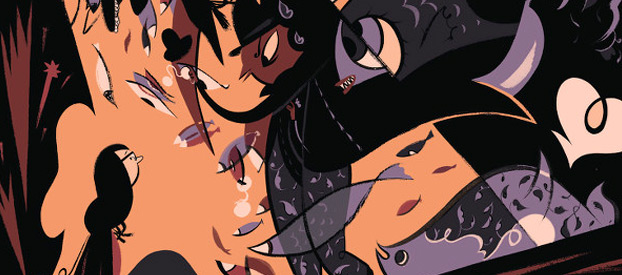
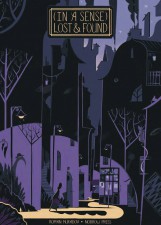
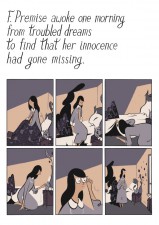
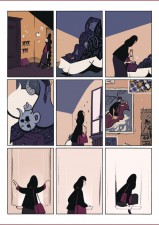
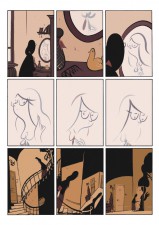
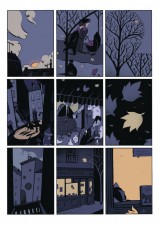
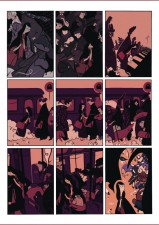
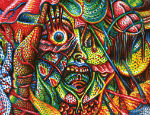
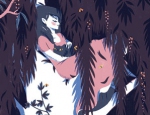
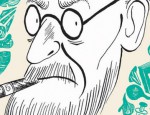
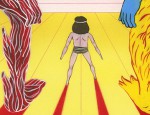
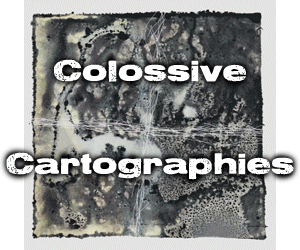





[…] Creators | Roman Muradov discusses his first full-length graphic novel, (In A Sense) Lost and Found, published by Nobrow. [Broken Frontier] […]
[…] Mikhail Bulgakov, for an ex-pat Russian (EDIT: Armenian, but Russian-raised) who prefers Irish literature, but he’ll have to sigh and bear […]
[…] Croonenborghs, B.(2015), “An interview with illustrator and cartoonist Roman Muradov“, brokenfrontier (accessed 16th December […]
[…] Mikhail Bulgakov, for an ex-pat Russian (EDIT: Armenian, but Russian-raised) who prefers Irish literature, but he’ll have to sigh and bear […]